- Home
- Gerald Durrell
Catch Me a Colobus Page 8
Catch Me a Colobus Read online
Page 8
The next thing we had to do was to try and organise some staff, and so I made my first contact with Sadu. His name had been given to me by a friend who had spent several years in Sierra Leone and had employed him. He said that Sadu was an excellent cook and, moreover, was honest and a hard worker. Sadu himself turned out to be a tiny wizened little man, with a face rather like a monkey’s and an impish grin. When we had settled on his salary, I told him to go to the town and search for a ‘small boy’. Now a small boy, in West African parlance, means a sort of second-in-command. He’s really the boy who peels the potatoes, makes the beds, and does all the dirty jobs, while your cook – or the steward, if you’ve got one – does the less menial tasks. Presently Sadu returned with Lamin, who was a boy of about fourteen, very shy, with a charming grin. We employed him on the spot. Then came the great day. All the documents had been stamped and signed and sealed, everything was ready, and the large Land Rover (the small one was being left in Freetown for the BBC team) was piled up with all our gear, with Sadu and Lamin installed in the back. We climbed into the cab and drove off up country.
The first part of the drive was magnificent. Smooth macadam roads, and all the trees and bushes hung with flowers, red, yellow, purple and white, and then – at mile ninety-three – BANG! we hit the laterite. Red dust was plastered all over the plants and the trees on the roadside, and this fine red dust gets into your eyes and lungs and everywhere. It has the consistency of talcum powder and can slither through the tiniest crack. The corrugation in the laterite, caused by the winter rains and the wind, make the vehicle shudder so that after a few miles you feel as though you’ve been riding on a pneumatic drill for at least three hundred years.
The road seemed to wind on for ever, and the dust to become thicker and thicker. Occasionally, we would pass through a palmleaf thatched village and all the young children would run out, eyes shining, teeth glistening, to wave pink palms to us in greeting as we passed. Sometimes a pair of hornbills would fly across the road, their wings flapping madly, their long beaks making them look top heavy. One got the impression that they had to flap their wings so wildly since otherwise the weight of their beaks would make them nose-dive instantly to the ground.
After some hours of driving, we reached the village of Bambawo. The chrome mines lay in the hills behind Bambawo, but it was in the village itself that we were supposed to pick up the caretaker who had the keys to the various houses. This we duly did. Then we branched left and wound up into a low range of hills which lay behind the village. As we climbed higher the road got worse and worse, but the forest became more magnificent because this was real forest, not secondary undergrowth; gigantic trees standing on huge buttress roots covered with orchids and various epiphytes, and great waterfalls of giant ferns. As the forest grew thicker, my thoughts on what type of accommodation we were liable to find up there got more and more gloomy. Then we rounded a corner and there were the chrome mines. They were completely and utterly unexpected. First there was quite a large administration block. We drove past this and saw that there was a swimming-pool – empty, of course, and full of dead leaves, but a pool nevertheless. The road wound up a little higher and then, spread out along the top of the hillside, were some seven or eight beautiful little villas, each one tucked away amongst the trees, and each commanding the most magnificent view down over the plain in which the village of Bambawo lay, and across hundreds of miles of thick forest to the Liberian border. A lot of the houses had, of course, been allowed to go to wrack and ruin but we discovered two, both commanding magnificent views, quite close together and in excellent condition.
While our things were being unpacked and stacked in the house, I discovered from the caretaker that the administrative block contained a dynamo to produce electricity for this little village, and that, if we cared to obtain the necessary oil and petrol to work this, what he referred to as the electro-shitty man would be only too happy, for a small sum of money, to come up and run the dynamo for us. So this was organised, and I also arranged for two stalwarts from the village to clean out the swimming-pool and fill it. Long John and I spent the rest of the day unpacking our things and putting them in heaps in various parts of our spacious accommodation, and then, that evening, we sat down to an excellent curry which Sadu had produced.
‘You know, this was the part I was dreading most,’ said Long John, sipping his cold beer appreciatively. ‘The grass shack stuff, you know, scorpions in the roof and the spiders, warm beer . . .’
‘You just shut up and concentrate on your food,’ I said. ‘We’ve been damned lucky. I’ve never had a camp as luxurious as this. Do you realise that we have a bath and a lavatory that really work? That’s the height of luxury.’
We soon found that the chrome mines had other treats in store for us. For example, the water that we got came from springs in the forest just a little way behind the houses and so was pure enough to drink without our going through the awful tedious process of having to boil and filter it first. Also, there were no mosquitoes; we were high enough to catch every cool breeze that was going and so it never became oppressively hot in our houses.
The next few days were fairly hectic. We had an interview with the chief of Bambawo, a kind elderly man, to explain to him why we had come and to ask him if he could enlist the aid of the villagers for catching us ‘beef’. ‘Beef’ is the term which is used in West African pidgin to describe any animal from a frog to an elephant. We then engaged a carpenter and set him about the task of building a series of boxes to which we could attach the cage fronts which we had brought out ready-made from England. Very soon we had an impressive row of cages, all completely empty. We then drove to every village within a twenty mile radius and spread the tidings of our arrival and of what we were trying to do; saying that we would return in three days’ time to see if they had managed to capture any beef for us.
We had returned one evening from what Long John called one of our whistle-stop tours, had bathed and changed and eaten in self-satisfied silence, and were just relaxing preparatory to going to bed, when we heard a curious noise coming from down the hill; the sound of pipes and drums and chanting. Presently we saw a line of people coming up the road below us with their hurricane lights flickering as they passed through the trees.
‘Who on earth can they be?’ asked Long John, for the road led nowhere but to our house.
‘I don’t know,’ I said. ‘I suppose it’s some sort of deputation from the village. Perhaps the chief’s sent his band up for us, or something.’
We waited patiently, and presently the crowd of singing, chanting Africans appeared round the side of the house and lined up in front of us on the veranda. Two men in their midst were carrying a pole across their shoulders and from it was dangling quite a substantial cage made out of rough logs.
‘Ah! I said to Long John. ‘This looks like our first beef. Now, whatever it is, don’t get too excited over it, otherwise the price will go up.’
‘No, I won’t,’ promised Long John. ‘I’ll try and pretend that it’s something so revolting that we wouldn’t have it even if they gave it to us.’
‘Now, what you get, my friends?’ I asked the assembled crowd.
‘Beef, sir. Beef!’ came an immediate chorus from the crowd, and their teeth shone white in the lamplight as they grinned proudly at us.
They had put the cage at our feet and we tried to peer through the logs to see what was in it. It was big enough, I thought, to contain quite a large animal. However, we could see nothing, so we moved it into the light and cut through the bush ropes that had been used to tie down the lid.
‘Careful, sir!’ said one of the hunters, as I gingerly lifted the edge of the lid to see what the cage contained. ‘This beef go bite you.’ I lifted the lid a bit more and peered into the large box. Then, suddenly, in the crack appeared the most appealing face. It was a tiny Spot-nosed monkey who would have fitted conveniently into
a large teacup, and his little green face had a heart-shaped white spot of fur on the nose. His eyes glistened and he peered at me through the crack. Then he uttered the piercing squeak of the baby monkey that was to become such a familiar sound in camp. I threw back the lid and lifted him out. He had a greenish body, a long tail, and a wistful face. He clung to my fingers tenaciously and uttered another tremendous wail.
‘Dis beef no go bite,’ I said to the hunter. ‘Dis no be big monkey, dis be picken monkey.’
I knew this ploy of old. For some obscure reason the Africans always imagined that if they could make out the animal they brought you to be more savage than it was, you would automatically pay more for it. I handed the baby monkey over to Long John, who enveloped it gently in his enormous hands and held it while I got on with the bargaining. This was a protracted business and I eventually beat the man down from five pounds to two pounds. This was really far in excess of what the baby monkey was worth, but I have always found it a good policy to start paying a little more than you should for the first animals in order to encourage the hunters to go and get more; then you can drop your prices. So, eventually, well pleased with their bargain, the group left us, singing and chanting and beating on their little drum. They disappeared down the hillside, while Long John and I went and got some warm milk and fed the baby monkey, who was terribly hungry. Then we gave him a nice warm bed of dried banana leaves in one of our cages and left him for the night.
‘Well,’ I said to Long John, as we climbed into bed, ‘that’s our first beef. Not such a bad one at that. Spot noses are quite rare. Maybe it augurs well for the future.’
During the next week the news of the price we had paid for the monkey spread, as I had anticipated, and soon there was a steady trickle of hunters coming up to the house with a strange assortment of beasts. There were bats and baby owls, brush-tailed porcupines, more baby monkeys, giant rats the size of a kitten, and mongooses in a variety of shapes and sizes. Also, our whistle stop tours of the villages round about had paid dividends and when we went to visit them again we rarely came away empty handed, even if it was only a tortoise or a young python that they’d managed to catch for us. Our cages were full of whistlings, rustlings, squeakings and hootings, and we felt that by the time the BBC arrived we would have a nice collection of animals with which to greet them. However we had not as yet got our two prime objectives for coming to Sierra Leone: one, the beautiful Colobus monkeys, the other, leopards. Then, just before the BBC arrived, we did get our leopards, but in the most unexpected way.
I had questioned all the hunters carefully as to the possibility of getting some of these beautiful cats which are becoming increasingly rare throughout their range, owing to the fact that they are shot for their skins. All the hunters shook their heads and said that leopards were ‘hard too much’ to catch. I began to think that we weren’t going to get any, when one day a very battered Land-Rover appeared winding its way up the road towards us. When it stopped, a lanky young American with curly hair got out and introduced himself as Joe Sharp. He said he worked with the Peace Corps in Kenema, and he had heard we were animal collecting. Would we, by any chance, be interested in a pair of leopards?
‘I’d say we would! Why? Do you know where there are some?’
‘Well,’ he answered, laconically, ‘I’ve got a pair myself. I got them off a hunter and hand-reared them. They’re about six months old . . . I thought you might be interested in them.’
‘I certainly am,’ I said eagerly. ‘Where are they?’
‘They’re here,’ he said, gesturing towards the back of his Land-Rover.
He walked round to the back of it and opened the door, and out jumped two of the most beautiful leopards I’ve ever seen. They were each about the size of a large labrador retriever, beautifully marked, with sturdy legs, and their skins shone in the sunlight as they wound themselves round Joe Sharp’s legs, purring loudly. They were each wearing a collar and to these Joe attached two leads. We led them round to the front of the house, tied them up on the veranda and sat gloating over them.
‘They’re called Gerda and Lokai,’ said Joe, stretching himself out in a chair and accepting the beer that I offered him. ‘I think they must be brother and sister because they were brought in by the same hunter at the same time, and they were both approximately the same size, although you’ll see Gerda’s a little more slender than Lokai.’
Lokai had put his paws on the table and was sniffing at my beer suspiciously. He then peered earnestly into my face and gave my hand a quick lick with his rasplike tongue.
‘Well, they’re yours if you want them,’ said Joe. ‘I don’t want to part with them, really – I’ve got very fond of them – but I’m going back to America shortly and it would be impossible to take them back there.’
‘We certainly will have them,’ I said. ‘I think they are the most handsomely marked leopards I’ve ever seen. Are they completely trustworthy at the moment?’
I said this because, at that precise juncture, Lokai had got down from the table and wrapped his paws affectionately round my leg. I could feel his claws digging into my skin.
‘Well,’ said Joe, ‘now there’s a point. They’re OK with me, and they’re OK with some of the other guys down in the Peace Corps. But there are one or two they’ve taken a dislike to, and then they get a bit funny. Lokai likes to jump on you from the top of a door, for example, and if he hits you at the wrong angle he’s quite a weight.’
‘If he hits you at the wrong angle I should think he could break your neck,’ I said, disentangling Lokai’s paws from my leg with difficulty.
‘Oh, I think they’ll settle down all right,’ said Joe. ‘They’re very nice-tempered, really.’
‘Where,’ inquired Long John, putting his finger on the crux of the whole problem, ‘where are we going to keep them?’
The thought hadn’t occurred to me. It was the carpenter’s day off, and in any case we hadn’t got a crate big enough to take them. One would have to be specially built, which meant a trip into Kenema to get sufficient planks to do it. All this would take time, and the BBC were arriving the following day. I thought about the problem for a moment, and then I remembered that just between our house and the little house farther down the hill that the camera crew were going to occupy, there was a small hut, measuring some six foot by ten and about nine foot high, which I presume at one time had been used as a sort of staff lavatory. If that was cleared out, I thought, the leopards would be quite happy in there until we could get a proper cage made for them. We went down immediately to inspect the hut and found that it was perfectly adequate for the leopards, except that there was a gap between the roof and the top of the wall of about eight inches. But Joe assured me that they wouldn’t be able to get out of that.
So we took Gerda and Lokai down to their new quarters, after they had been cleaned out, and gave them a large plateful each of their favourite tinned dog food which Joe had been rearing them on. Then we left them to their own devices and went back to have another beer. That evening, after Joe had left us, Long John and I, in some trepidation, carried down the leopards’ evening meal. As soon as they heard us approaching they set up such a series of yowls and purrs and scratchings at the door that Long John and I looked at each other in alarm.
‘I think,’ I said, ‘I think we ought to be armed for this operation.’
So we cut ourselves two stout sticks just in case.
‘Now,’ I said, ‘I think if we open the door cautiously and push one bowl of food in, that will keep their attention occupied and we can get the other bowl in and the dirty bowls out.’
‘Yes . . .’ said Long John, doubtfully.
We opened the door slowly and cautiously, and immediately the leopards flung themselves at it, snarling with satisfaction at the smell of the food. We pushed the plate in hastily, and it skidded across the floor into the far corner, the
two leopards chasing madly after it. Then we whipped in, got the dirty plates out, put the second plate of food on the floor, and made a hasty retreat, slamming and bolting the door behind us.
‘Whew!’ said Long John. ‘They’re going to be a bit of a handful, aren’t they? The sooner we can get them into a cage the better.’
‘We’ll have to get cracking first thing tomorrow,’ I said. ‘If you go into Kenema and get the planks, I’ll persuade the carpenter to do some overtime. He should have the cage ready by tomorrow evening, I should think. It’s quite a simple construction, anyway.’
‘Righto,’ said Long John. ‘But I don’t fancy feeding them in the morning. I might not be alive to get to Kenema.’
‘Well, there’s nobody else who can do it, so we’ll just jolly well have to.’
‘Ah, well,’ said Long John. ‘I suppose it is what would be classified as a hero’s death.’
And on this sombre thought we went to bed. The following morning, by the same rather complicated process, we fed the leopards and then, when they had finished, cautiously opened the door and peered at them. They were lying there licking their lips and purring with gentle satisfaction. It seemed as though the food had had a soothing effect upon them. As we had to get on intimate terms with them in any case, I thought this was as good a time as any. So Long John and I locked ourselves in the lavatory with the two leopards and talked to them and stroked them. Gerda seemed to show an immediate preference for Long John, and Lokai for me. That is, if you can call putting his two fat paws on my knee and then stretching himself and yawning and digging all his claws into my kneecap, a sign of affection. After half an hour of this we put some fairly lengthy ropes through their collars and took them out for a little walk. They behaved very sedately and really looked magnificent in the sun. When the time came to take them back, however, we had a bit of a struggle, but fortunately, with the aid of another plate of food, it ended without any bloodshed.

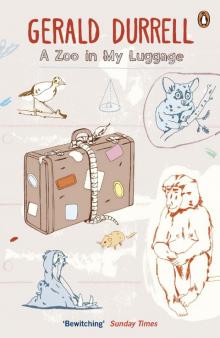 A Zoo in My Luggage
A Zoo in My Luggage The New Noah
The New Noah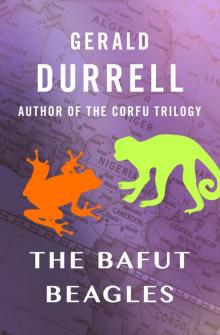 The Bafut Beagles
The Bafut Beagles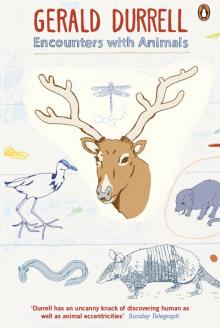 Encounters With Animals
Encounters With Animals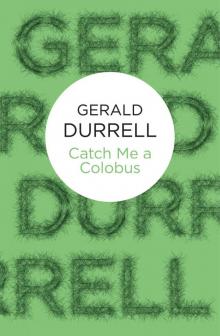 Catch Me a Colobus
Catch Me a Colobus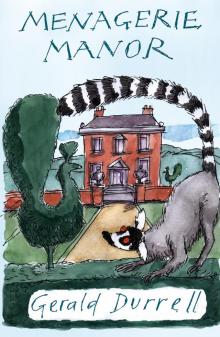 Menagerie Manor
Menagerie Manor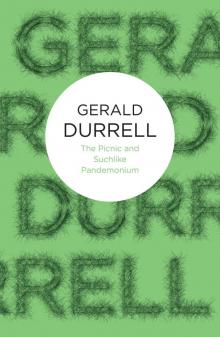 The Picnic and Suchlike Pandemonium
The Picnic and Suchlike Pandemonium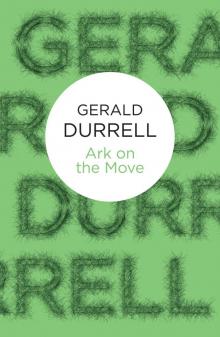 Ark on the Move
Ark on the Move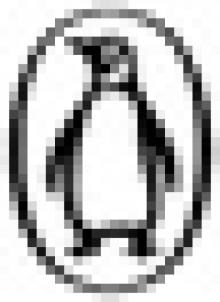 My Family and Other Animals
My Family and Other Animals Two in the Bush (Bello)
Two in the Bush (Bello) The Stationary Ark
The Stationary Ark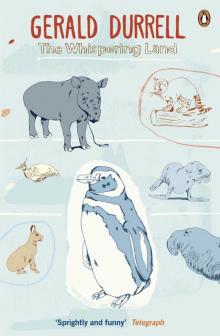 The Whispering Land
The Whispering Land Three Singles to Adventure
Three Singles to Adventure Fillets of Plaice
Fillets of Plaice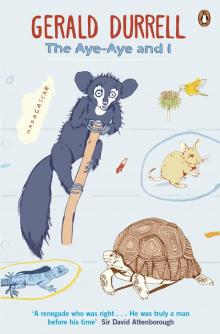 The Aye-Aye and I
The Aye-Aye and I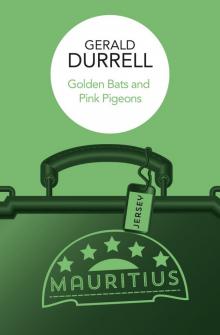 Golden Bats & Pink Pigeons
Golden Bats & Pink Pigeons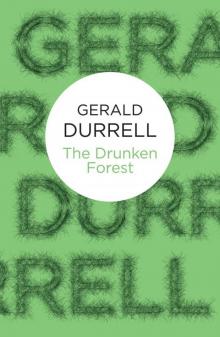 The Drunken Forest
The Drunken Forest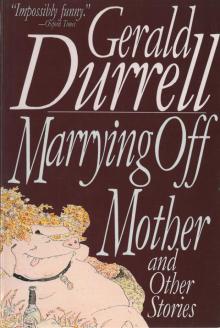 Marrying Off Mother: And Other Stories
Marrying Off Mother: And Other Stories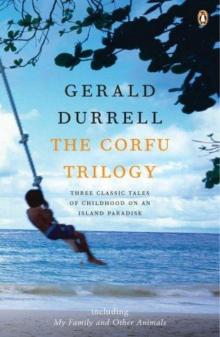 The Corfu Trilogy (the corfu trilogy)
The Corfu Trilogy (the corfu trilogy)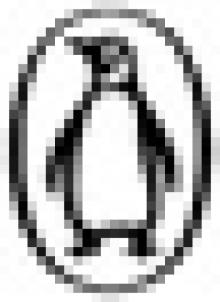 The Corfu Trilogy
The Corfu Trilogy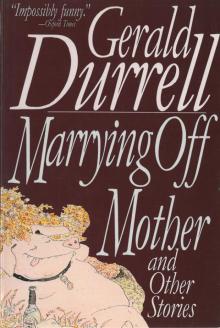 Marrying Off Mother
Marrying Off Mother Two in the Bush
Two in the Bush